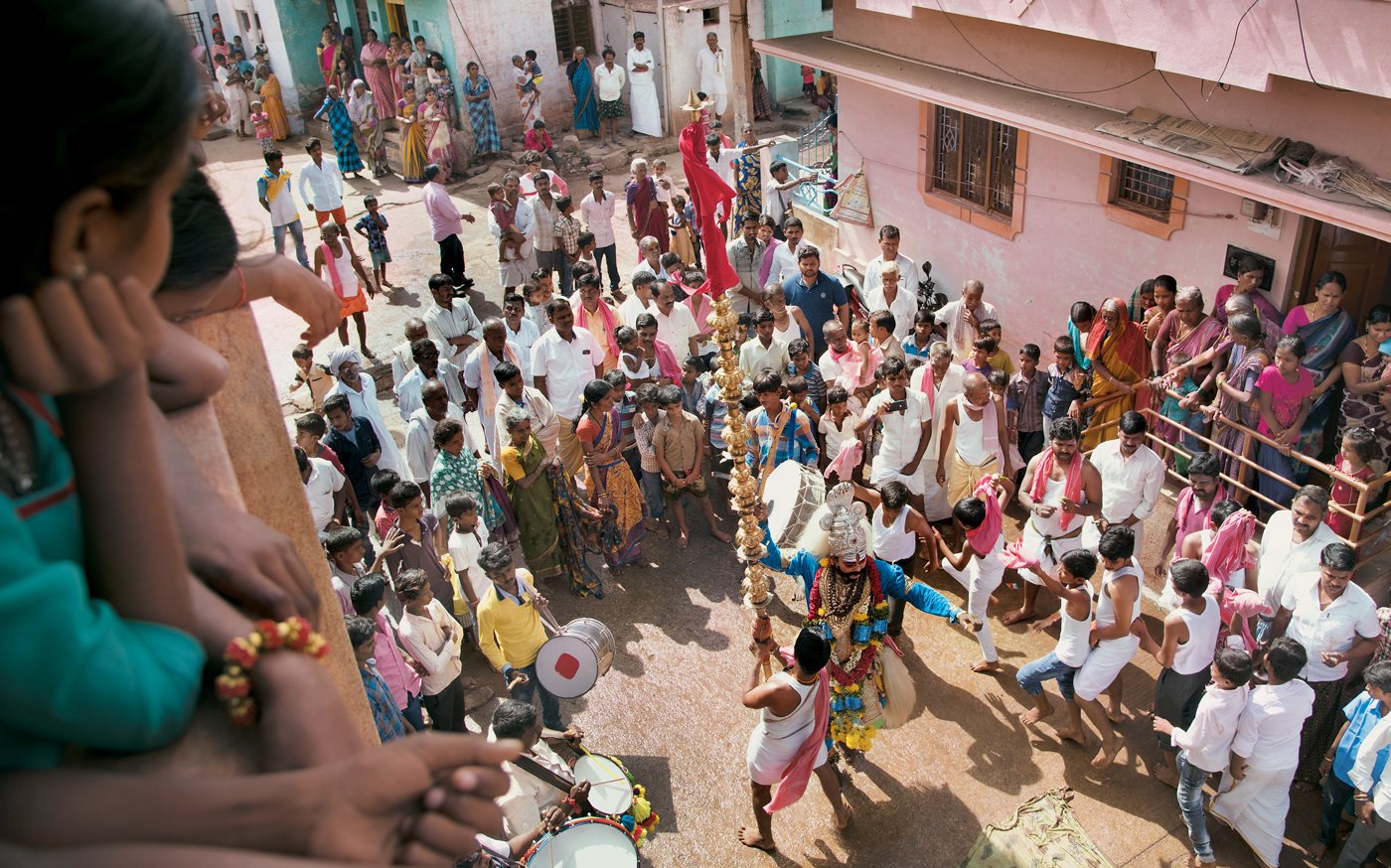
RESPONSIBILITY WITH A HOLISTIC VIEW
JSW Foundation
JSW, previously known as Jindal South West, is a Mumbai based organization
and one of the leading conglomerates in India.
From its inception as a steel company, JSW has expanded into a 13 billion
dollar company expanding into other industries such as energy, cement,
minerals, port and infrastructure, etc. Owing to its exponential growth, JSW
has forayed into multi-national markets, having a notable presence in North
America, Europe, South America, and Africa.
Recognizing the necessity of contributing to the growth of the country from
both ends of the economic spectrum, JSW established a social development
wing, the JSW foundation, in 1989. It envisions “empowered communities
through sustainable livelihood”. The foundation is committed to reducing
social inequalities by providing better opportunities through health,
education, skill development and employment. It focuses on providing clean
drinking water and clean air to breathe while also indulging in water
conservation and agriculture related projects.
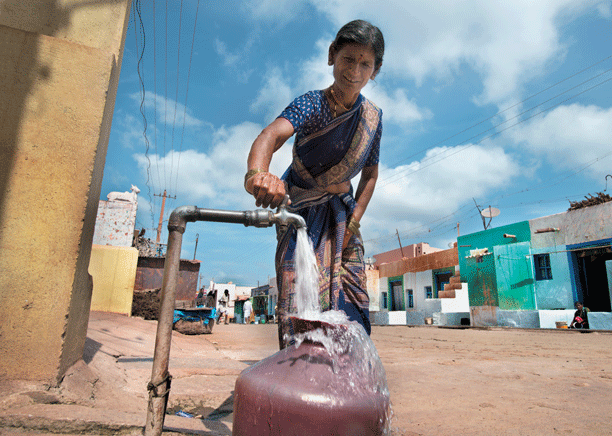
The village receives drinking water through pipelines
The linchpin to any successful CSR activity is the trust garnered between the organization and the community. One of the major accomplishments of the JSW foundation has been this cultivation of trust between the company and the community.In Bellary, Karnataka, the villagers had provided their land to JSW for the construction of plants and factories in the hopes of employment opportunities and development in the area.This faith has been repaid by the organization as it managed to absorb most of the village youth and women by employing them into their factories and plants.
The significance of this job creation, especially
among the youth, can be further appreciated by considering the alarming past of the
area.Youth in the villages around Bellary, on account of being near one of the
booming mining areas of south India, were roped in by the mining mafia, enticing
them with bikes and mobile phones, to do illegal activities for the mining mafia.
There has been a significant dip in the number of youth opting to work for the
mafia, and the stable, much safer, employment provided by JSW can certainly be
listed as one of the factors for this. Apart from this, the JSW foundation has
engaged themselves in a host of developmental activities around the 30 villages
surrounding JSW campus.

Treated sewage water is directed onto the farmlands
In Jaigad, Maharashtra, the area around the JSW energy plant and port is divided into Direct Impact Zone (DIZ) and Indirect Impact Zone (IDIZ). DIZ is confined to 10 kms radius from the plant, and Jaigad, Nandivade, Sakar Mohalla, Chaferi and Kasarsandelavgan are the five villages falling under this zone. According to Head CSR, JSW Energy Ltd (Ratnagiri), the company is trying to double the income of villagers falling in this region under their CSR initiatives. “We are trying to upgrade their standard of living and provide best possible facilities required to live a good and healthy life”, he adds.
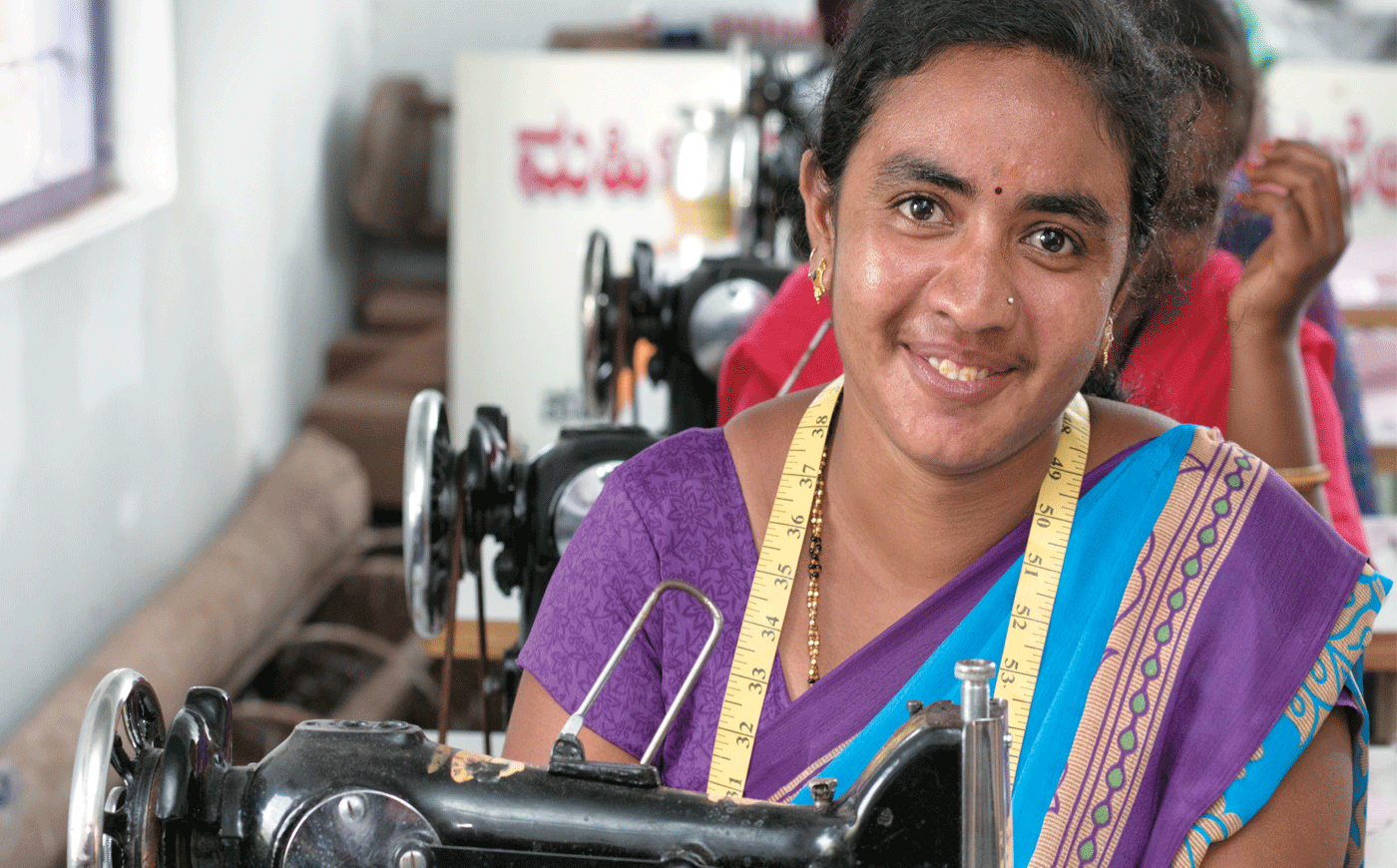
Tailoring units area means of joy and income for the women of Bellary
The upliftment initiative is not only confined to the academic level as JSW under its CSR project has built a skill centre in Jaigad. The Skill centre comprises of BPO for girls who are willing to work (training and work) and courses in tailoring (fashion design) for girls and marine fitting for boys. Under the BPO, 125 girls from the five neighbouring villages that is the DIZ area are currently employed. Prior to the recruitment, the girls undergo a six month training process which helps them to enrich their skills for BPO operation.
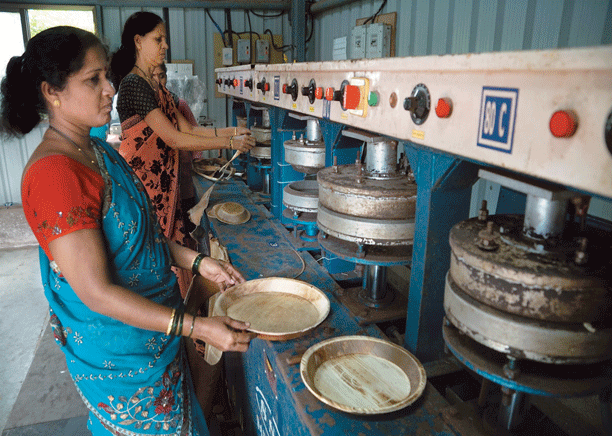
Women are taught to make plates from betel nut leaves as a method of low-cost income generation
Currently there are 125 computers in for the BPO and the new batch of 30 is being trained. The JSW foundation also provides highly subsidized diploma courses for Industrial training and nursing, in collaboration with reputed institutes, at the Om Prakash Jindal centre for vocational training in Bellary. The village youth who go through the training are absorbed into JSW factories and hospitals.In Dolvi, Maharashtra, a women centric BPO has been set up for 120 participants with an investment of 1 crore rupees. It provides 3 month courses to the women, training them on E-publications and health care sectors. The women are provided a stipend of 3500rs per month during the training period.
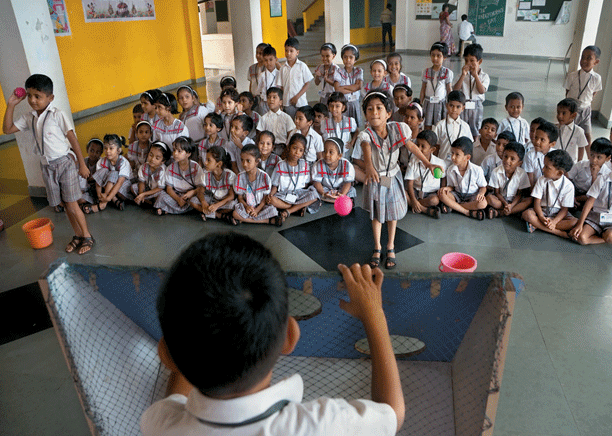
Countless children have benefitted form the infrastructure support in schools
The company has set up a CBSE school, Jindal VidyaMandir, fully equipped with all the facilities under the CBSE guidelines in Jaigad. The school started with 40 students in 2010 and now has strength of 571 students, 35 teaching staff and 10 support cadre. In Bellary, the JSW foundation has directly facilitated the workings of around 42 schools in the locality by providing them with infrastructure, teacher’s training, and model toilets among other help.
In a unique initiative, the foundation has provided solar lamps to the students with the chargers fixed in the school. This has been done with the dual motive of providing the amenity as well as ensuring the students’ attendance. The school is also provided with computer aided teaching which utilises visual and auditory methods to enhance the learning of the students.
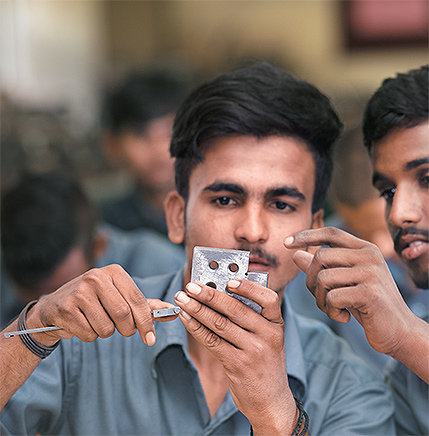
The youth of Bellary are given special training and then directly absordbed into the JSW plants
The SHGs, on average, consists of 12- 20 participants complete with an accounts keeper and two representatives who are also the signatories. The members are initially given accounts training and a general awareness about the benefits and functions of an SHG. It is also seen to that the positions of the account keeper and the signatories are rotated so as to ensure the participation of each member. The rotation method also allows for capacity building and increased familiarity with the banking procedures to take place during the process. Through the SHG, the women are able to acquire interest free loans from banks which they channel into income earning activities. For example, in the village of Thalur, Karnataka, an SHG comprising of 10 women have successfully set up petty shops, small businesses from the loans they have received. There are 300 such SHGs set up in different villages which have a combined membership of approximately 5000 women. All of these self-help groups, remarkably, boast of a 100% loan repayment.
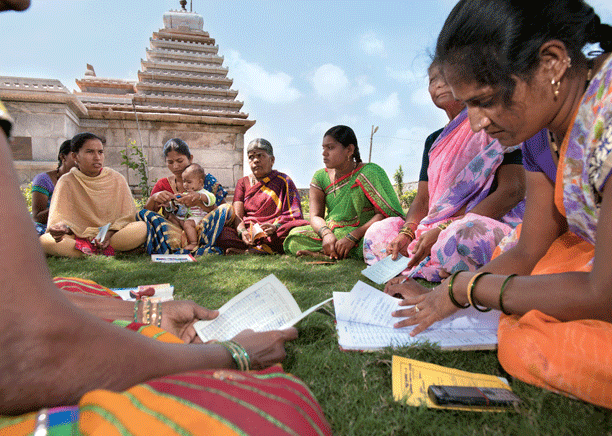
The premises of Sri Eshwara temple, which was reconstructed by JSW, are often used as meeting grounds by SHGs
Keeping with organizational philosophy, a strategic and timed intervention is extended wherein the pregnant mothers are initially identified, provided with pre and post pregnancy counselling through a door-to-door counsellor, and offered institutional delivery at half the price. These include the costs of scanning, medicines and other services. Further, a bi-weekly general health camp is conducted in all the villages with an on- demand multi- speciality health camp on Saturdays. Due to the huge amount of raw materials required for the factories and plants, JSW has a hub of truckers coming from different parts of the country.
In both the Bellary and Raigad plant, the truckers
are given de addiction training by means of behaviour change therapy, counselling,
road safety awareness, AIDS awareness programs, general health check up etc.Besides,
In Jaigad, JSW has also undertaken other initiatives like building a health care
centre with full time male and female doctor and basic facilities like X-Ray labs,
ECG centre, basic lab test and a cardiac ambulance for the DIZ. The health care has
six bed facilities and basic pharma amenities. The company has also invested in
sanitation awareness campaign and has played a pioneering role in building toilets
in all available houses in the village. All five villages under the DIZ are open
defecation free villages with company investing Rs 88, 32, 002 through its CSR fund
for this purpose
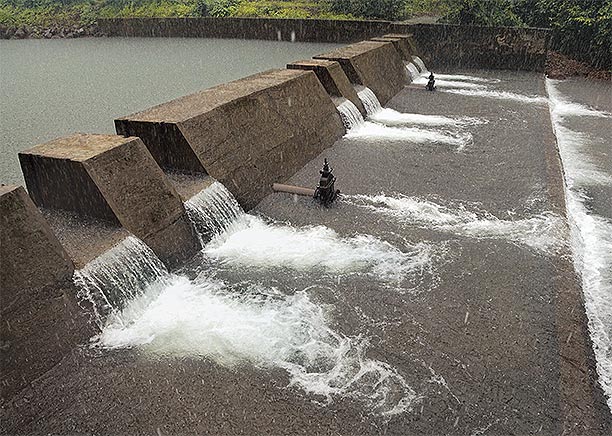
Check dams are constructed to pool running water for the farmlands
Konkan, unlike many parts of Maharashtra is not a drought prone region; but being a coastal region, the water table is salty and being on the receding slope of Sahyadri ranges, the rain water ends up in the sea. Thus during hot summer, villagers of Jaigad and nearby villages complain of lack of water not only for farming but for drinking purposes. JSW has tried to address this problem through their water shed management initiative, they have completed 21 small and medium size dams to arrest the rain water and create a reservoir which could be used by villagers for throughout the year.“The structure in Watad is one of the major project under the JSW initiative and is solving the water problems of six adjacent wadis (very small villages)” says Prashant Ghosale, Sarpanch of the Watad village.
These initiatives are under taken by JSW after consultation with Gram Panchayat, Agriculture department, Regional water supply department and minor irrigation department of the government adds Ghosale.In Dolvi, Maharashtra, JSW foundation has a flagship project which focuses on the restoration of the mangrove forests. The aim is to restore 200 hectares of mangrove trees in an effort to strengthen the embankment near the sea side. A weakening of the embankment in the area had led to the spilling of sea water on to the farmlands, leaving salt residues that make the land unsuitable for agriculture. On conducting hydrological and soil tests, in consultation with the Nature Environment Wildlife and Society (NEWS), an 18 km stretch of land was planted with mangroves, using jute bags instead of plastic for the nursery. The project which was initiated in 2016 had employed 81 SHGs consisting of around 820 women, local villages, and panchayat members in the entire process. The project targets the plantation of a million mangrove plants by 2020, and has, so far, successfully planted 7 lakhs of them.




